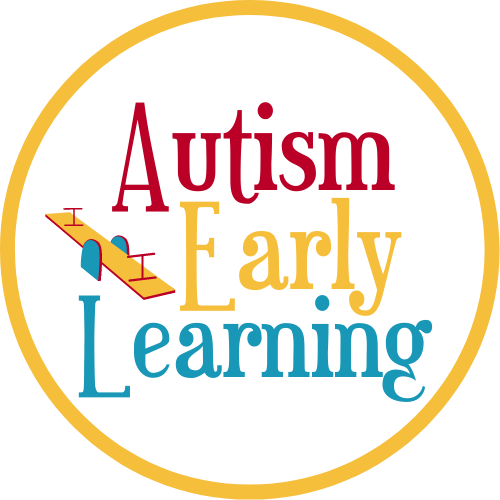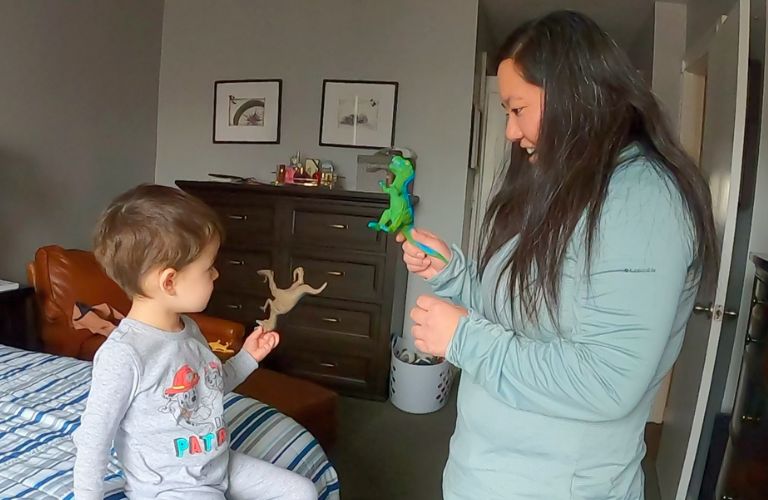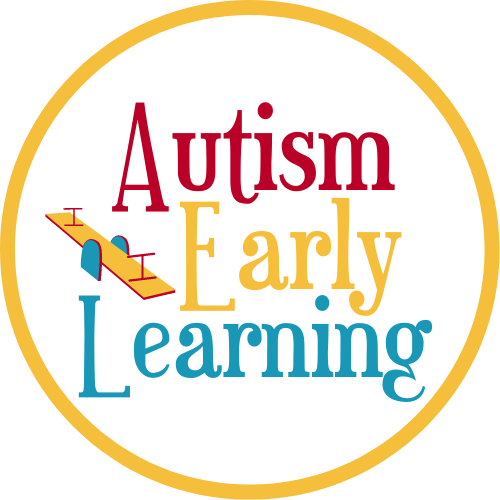From the time I first starting teaching autistic children in preschool, I have always loved watching their imagination bloom. Pretend play is so important and works on so many different skills.
- Problem solving
- Social skills
- Communication and language
- Cognitive skills
- Creativity
- Cooperative play
- Empathy
- Theory of mind
- Flexible thinking
- Emotional regulation
- And more

I remember walking down our long hallway with one child and every day in the same spot she would stop, strike a pose, and says “superstar!” It took me a few weeks to figure out why she was doing that. I realized that there were spotlights shining on some pictures in the hallway, and every time she saw those spotlights she acted like a superstar. It was so fun.
I had another kid that I worked with, and when we began he rarely engaged with others. He liked to collect toys and carry them around, but he didn’t really play with them how some people would expect. He would mostly just hold them. After a year or so his imagination just went wild. We were catching wild animals and taking them to the zoo only for them to escape again. The things he came up with were so great!
For some kids, pretend play comes naturally. For other kids, we have to help facilitate pretend play for them to learn how to play pretend.
In general (obviously each child is different and learns differently) if a child is not yet engaging in play with others yet, I would focus more on that. Honestly, some kids may be pretending as they play, but not engaging with others. If this is the case, I would still focus more on engagement.
If your child is engaging with others, and is having 20+ consecutive circles of communication in a variety of settings with a variety of people, then they are likely ready to start participating in more pretend play.
5 Things You Can Do When You Can't Get Your Child To Engage In Play
Enter your name and e-mail to receive your 5 Tips To Improve Engagement along with more strategies and techniques to help you increase learning and growth.
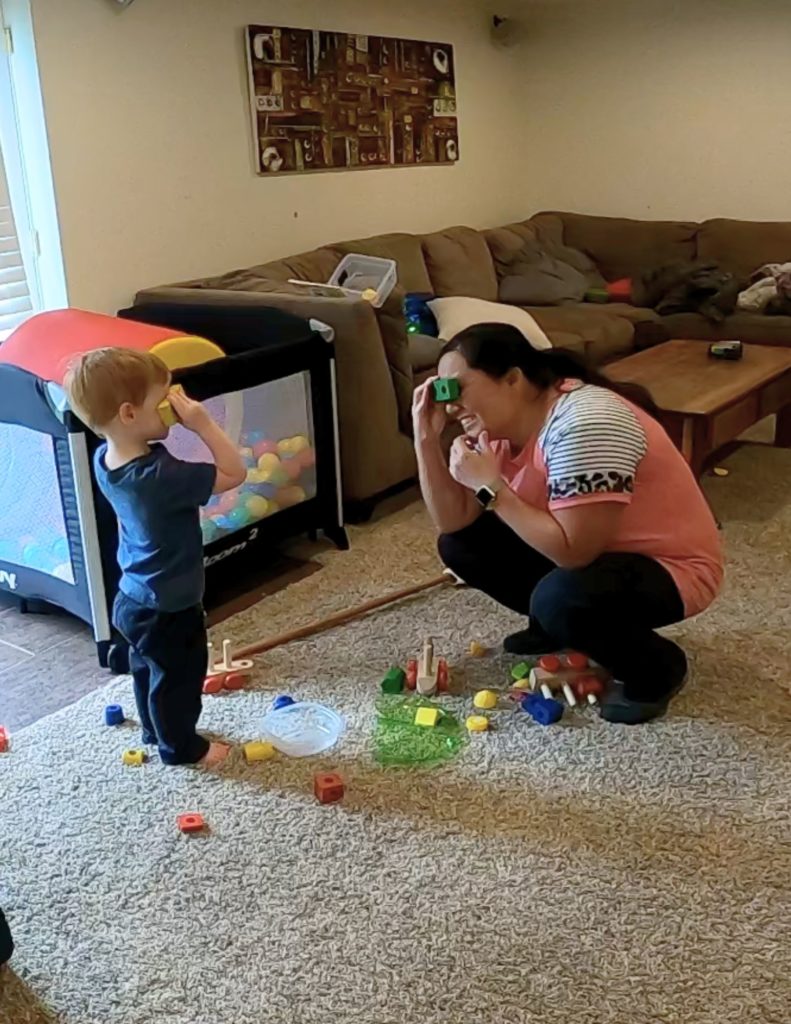
How to introduce pretend play
When a child is starting to participate in pretend play, you don’t want to jump to everyone being a character and having storyline quite yet. They’re likely not ready for that yet.
I’m going to introduce just a few simple ways to gently introduce pretend play to give your child exposure to it and allow your child to come up with their own ideas. Yes, you can sit down and tell a child to “do this” but that is working on the motor skill of imitation. What we want is for your child to build his or her own imagination.
Yes, pretend play usually begins with imitation. However, natural imitation is still the child’s idea to do it. No one is telling them exactly what to do. They’re just seeing something that they like, it becomes their idea and so they do it too. And eventually they build upon it and come up with their own ideas.
Everything Come Alive
There is a technique called Everything Come Alive. I learned it when I was first trained as a Play Project consultant, but I know other professionals also use the term as well. It’s just like it sounds. You make everything come alive and have a voice. Have fun with it, find silly ways to make your child laugh. You are doing the pretending at this point, and your child is tolerating it.
- A child’s sock can start talking “Hey, I want to hop onto your foot. Wait, not that one!”
- The chicken nuggets start having a sword fight with the fries
- The toothbrush starts singing a song
- The garbage can lid starts to eat all the garbage
- The brush starts to walk over to the child

You can do this with anything and everything. The main point is that you’re modeling pretend play and your child is being exposed to different ideas.
Symbolic Play
Symbolic play is taking one object and pretending like it’s something else. If there’s certain toys that your child loves, use those toys, but play with them differently. This doesn’t have to be long and drawn out in the beginning. You’re just doing little things here and there.
- Make a block be a car
- Make a car be an animal
- Make a ball be an apple
- Make a book be a boat
- Make a lego be a phone
- Make a paintbrush be a broom

Symbolic play works a lot on flexible thinking as you pretend that an object is something that it is not. This can be hard for some autistic children. If it’s difficult, keep it simple. Don’t completely avoid it, just don’t do it so big and don’t do it with their comfort zone activities or special interest toys. Start with novel toys that your child doesn’t yet have set routines with. Do some give and take, and go slowly if you need to.
Puppets
I’m going to say puppets here, but you can use stuffed animals or little figurines too. Once again, at the beginning stages of pretend play, you are doing most of the pretend and your child is just allowing it. You’re modeling.
Be the puppet. Whatever you can do, the puppet can do. If you’re building a tower, the puppet can help build the tower instead of you. If you’re driving cars, the puppet can push the car around instead of you. If you’re playing chase, the puppet can be chasing instead of you.
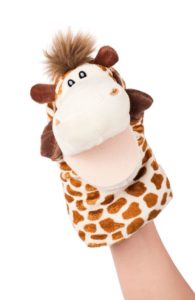
I like using puppets because you’re not really changing any of the activities, all you’re doing is having the puppet participate in whatever you’re already doing. You can still follow your child’s lead, only the puppet is following your child’s lead.
Puppets are a simple way to introduce pretend play. If your child rejects the puppet, give your puppet feelings. Your puppet can be sad, but can also go take a break and watch from a distance for a few minutes before asking to rejoin. If your child really doesn’t like the puppet, then find something else to use like a favorite stuffed animal or a different toy.
There are definitely other ways to introduce pretend play to your child, but I wanted to keep this simple so I’m just giving 3 ideas for now. Choose one, and try it out for a few days. Once it becomes more natural, then choose another one and try that out. Remember, have fun and enjoy your time with your child. Early intervention doesn’t have to be difficult, and doesn’t have to feel like a task. It can be fun as you continue to strengthen your relationship and build new skills.
